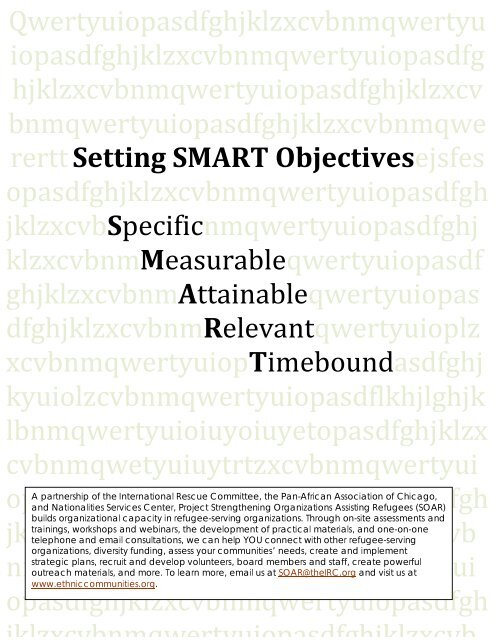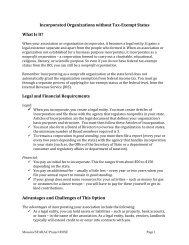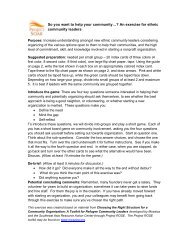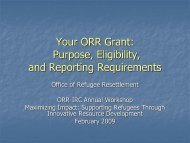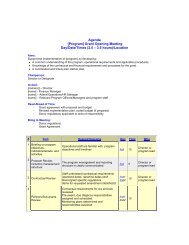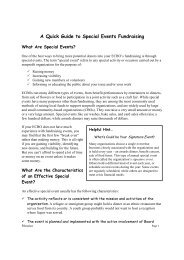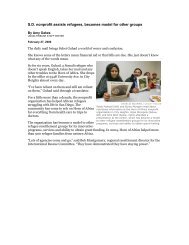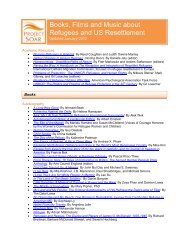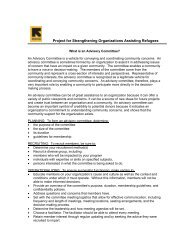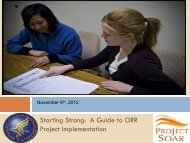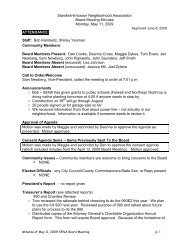SOAR SMART Objectives Toolkit - ethniccommunities.org
SOAR SMART Objectives Toolkit - ethniccommunities.org
SOAR SMART Objectives Toolkit - ethniccommunities.org
Create successful ePaper yourself
Turn your PDF publications into a flip-book with our unique Google optimized e-Paper software.
Qwertyuiopasdfghjklzxcvbnmqwertyu<br />
iopasdfghjklzxcvbnmqwertyuiopasdfg<br />
hjklzxcvbnmqwertyuiopasdfghjklzxcv<br />
bnmqwertyuiopasdfghjklzxcvbnmqwe<br />
rertt Setting <strong>SMART</strong> <strong>Objectives</strong>ejsfes<br />
opasdfghjklzxcvbnmqwertyuiopasdfgh<br />
jklzxcvbSpecificnmqwertyuiopasdfghj<br />
klzxcvbnmMeasurableqwertyuiopasdf<br />
ghjklzxcvbnmAttainableqwertyuiopas<br />
dfghjklzxcvbnmRelevantqwertyuioplz<br />
xcvbnmqwertyuiopTimeboundasdfghj<br />
kyuiolzcvbnmqwertyuiopasdflkhjlghjk<br />
lbnmqwertyuioiuyoiuyetopasdfghjklzx<br />
cvbnmqwetyuiuytrtzxcvbnmqwertyui<br />
opasdfghjklzxcvbnmqwertyuiopasdfgh<br />
A partnership of the International Rescue Committee, the Pan-African Association of Chicago,<br />
and Nationalities Services Center, Project Strengthening Organizations Assisting Refugees (<strong>SOAR</strong>)<br />
builds <strong>org</strong>anizational capacity in refugee-serving <strong>org</strong>anizations. Through on-site assessments and<br />
trainings, workshops and webinars, the development of practical materials, and one-on-one<br />
jklzxcvbnmqwertyuiopasdfghjklzxcvb<br />
telephone and email consultations, can help YOU connect with other refugee-serving<br />
<strong>org</strong>anizations, diversity funding, assess your communities’ needs, create and implement<br />
strategic plans, recruit and develop volunteers, board members and staff, create powerful<br />
nmrtyuiopasdfghjklzxcvbnmqwertyui<br />
outreach materials, and more. To learn more, email us at <strong>SOAR</strong>@theIRC.<strong>org</strong> and visit us at<br />
www.<strong>ethniccommunities</strong>.<strong>org</strong>.<br />
opasdfghjklzxcvbnmqwertyuiopasdfgh
Project Strengthening Organizations Assisting Refugees (Project <strong>SOAR</strong>)<br />
Guide to Writing <strong>SMART</strong> <strong>Objectives</strong>, Page 2 of 10<br />
What are <strong>SMART</strong> objectives Why should I create them, and how<br />
do I write them What’s the difference between goals, objectives<br />
and activities<br />
If you are asking yourself these questions, this Project <strong>SOAR</strong> toolkit is for you.<br />
After reviewing this brief toolkit and completing its activities, you will be able to:<br />
Explain to staff and volunteers why they should create <strong>SMART</strong> objectives.<br />
Write <strong>SMART</strong> objectives that will guide your work and that of your team.<br />
Decide how challenging your objectives should be – and how many<br />
objectives your projects should have.<br />
Distinguish between goals, objectives, and activities.<br />
Outline proven strategies to achieve your objectives.<br />
In describing your projects to funders or partners or writing reports or proposals,<br />
<strong>SMART</strong> objectives can assist you in describing what you hope to accomplish and how<br />
you hope to accomplish it. <strong>SMART</strong> objectives help you prioritize and explain your<br />
work – thus positioning your <strong>org</strong>anization to secure more resources and improve your<br />
services for refugees.<br />
This resource was produced by the International Rescue Committee under Cooperative Agreement #90RB0028/02 with the<br />
U.S. Office of Refugee Resettlement. You may distribute this resource with the following citation: Reprinted with the<br />
permission of the IRC. With questions about Project <strong>SOAR</strong>, contact <strong>SOAR</strong>@theIRC.<strong>org</strong>.
Project Strengthening Organizations Assisting Refugees (Project <strong>SOAR</strong>)<br />
Guide to Writing <strong>SMART</strong> <strong>Objectives</strong>, Page 3 of 10<br />
Part I: What’s the difference between goals, objectives and<br />
activities<br />
Goals – your broad intent<br />
Long-term changes in systems, policies, communities, <strong>org</strong>anizations, or people that<br />
are the results of your activities. Goals often relate to changes in knowledge, skills,<br />
attitudes, behavior, or conditions. You may need as long as a decade to see your<br />
goals accomplished. They are things you can influence, but cannot claim full credit<br />
for. NOTE: Some people use “goal” and “outcome” interchangeably, while others<br />
consider goals to be broader than outcomes.<br />
For Example – Goals:<br />
Refugee youth trust and respect others.<br />
Refugee families are fully engaged in their communities.<br />
Refugee families have safe and affordable housing.<br />
<strong>Objectives</strong> – your intended outcome, and how you will gauge success<br />
<strong>SMART</strong> objectives – which are specific, measurable, appropriate, realistic, and<br />
timebound – are what you expect to result from the activities you carry out. They are<br />
the observable changes in refugees’<br />
behavior, knowledge, or skills attributable<br />
to your project. <strong>Objectives</strong> answer<br />
questions like: what will happen as a result<br />
of our activities What difference will our<br />
activities make in the lives of refugees<br />
Most objectives will be attainable within<br />
the life of your project. Short-term<br />
objectives might take 1 to 3 years, while<br />
long term ones might take 4 to 6 years.<br />
For Example – <strong>Objectives</strong>:<br />
Tip: Most projects will have<br />
one or two objectives.<br />
Individuals can perform<br />
multiple goals, but the<br />
number varies depending<br />
on their background,<br />
experience, and workload.<br />
Too many objectives may<br />
result in people thinking they<br />
can’t meet their goal.<br />
Train 3 volunteers to use a new<br />
accounting system by March 20, 2009.<br />
Increase the number of case workers providing services to HIV positive<br />
refugees from 1 to 3 within 6 months of program launch<br />
Provide 25 refugees with start-up loans and monthly technical assistance to<br />
start their own small businesses before December 31, 2009.<br />
Instruct 30 mothers in English language and job readiness skills so that 90% of<br />
the mothers become successfully employed upon graduation.<br />
By 9/29/2009, increase by 60% funding to help refugees with job searches,<br />
transportation, and the purchase of uniforms.<br />
This resource was produced by the International Rescue Committee under Cooperative Agreement #90RB0028/02 with the<br />
U.S. Office of Refugee Resettlement. You may distribute this resource with the following citation: Reprinted with the<br />
permission of the IRC. With questions about Project <strong>SOAR</strong>, contact <strong>SOAR</strong>@theIRC.<strong>org</strong>.
Project Strengthening Organizations Assisting Refugees (Project <strong>SOAR</strong>)<br />
Guide to Writing <strong>SMART</strong> <strong>Objectives</strong>, Page 4 of 10<br />
Even more jargon… outcomes and process objectives<br />
Outcomes (or “summative”) objectives are the end result of your work. Outcomes<br />
objectives would measure the percentage of refugees you place in permanent<br />
housing the day of their arrival, the number of refugee women who achieve job<br />
upgrades, or the number of English language learners who progress to a new grade<br />
level, to give a few examples.<br />
Process (or “formative”) objectives measure quality. Process objectives would<br />
measure the quality of an apartment building where you place newly arrived<br />
refugees, the frequency at which case notes are updated, and to what extent they<br />
meet standards you have created; or the extent of follow-up you make with a<br />
refugee client, after you refer her to an intensive ESL program.<br />
Activities – what you’ll do to achieve your objectives<br />
The procedures, processes, events, actions or interventions that you propose to use<br />
to cause changes in the refugees you aim to assist. Activities are what you DO with<br />
your inputs (see below).<br />
For Example – Activities:<br />
Identify one community-based mental health provider in Los Angeles<br />
County and another in Orange County<br />
Train 2 case workers on HIV case management procedures<br />
Review annually policies and procedures for Microenterprise program<br />
Translate school readiness curriculum into Nepali<br />
Pop Quiz! Now that you know the difference between goals, objectives and activities<br />
answer the following questions. (Answers at the end of this toolkit.)<br />
5. Improve English comprehension 1 level for 25 refugees, within 2 years of program<br />
enrollment<br />
(a) goal (b) objective (c) activity<br />
6. Recruit 100 female refugees who are not accessing healthcare as program<br />
participants<br />
(a) goal (b) objective (c) activity<br />
7. Refugee families have living wage jobs<br />
(a) goal (b) objective (c) activity<br />
8. Increase the number of health counselors providing services to HIV positive refugees<br />
from 1 to 3 by November 30, 2008.<br />
(a) goal (b) objective (c) activity<br />
Some more definitions:<br />
This resource was produced by the International Rescue Committee under Cooperative Agreement #90RB0028/02 with the<br />
U.S. Office of Refugee Resettlement. You may distribute this resource with the following citation: Reprinted with the<br />
permission of the IRC. With questions about Project <strong>SOAR</strong>, contact <strong>SOAR</strong>@theIRC.<strong>org</strong>.
Project Strengthening Organizations Assisting Refugees (Project <strong>SOAR</strong>)<br />
Guide to Writing <strong>SMART</strong> <strong>Objectives</strong>, Page 5 of 10<br />
Inputs: The human, financial, <strong>org</strong>anizational, and community resources that you use<br />
through your activities to serve clients. Inputs include things like equipment, staff,<br />
volunteers, facilities, funding, and community goodwill.<br />
For Example – Inputs:<br />
grant from a community foundation<br />
partnership with the Workforce One Center<br />
job readiness training curriculum in three languages<br />
one full-time AmeriCorps*VISTA volunteer<br />
Outputs: The amount of “stuff” you provide during the life of your project. Outputs are<br />
the PRODUCTS of program activities. Outputs answer questions like, “How much”<br />
and “How many”<br />
For Example – Outputs<br />
number of refugees taught<br />
number of dollars worth of training guides distributed<br />
number of referrals made<br />
number of hours of service provided<br />
Indicators: The observable conditions that will tell you that your project achieved its<br />
outcomes. Process indicators tell you about your project’s progression (i.e. about the<br />
availability, utilization, and quality of services). Result indicators tell you about<br />
whether your objectives have been achieved (i.e. changes in knowledge,<br />
perceptions, attitude, skills, or behaviors). Indicators answer questions like, “Are we<br />
there yet”<br />
For Example – Indicators:<br />
number of case managers trained<br />
percentage of trained immigration staff who received rating of “good” or<br />
“excellent” on final training exercise<br />
Part II: Why set <strong>SMART</strong> objectives<br />
<strong>SMART</strong> objectives – whether for a funder, a performance management system, or an<br />
annual plan – tell you what you must do to achieve your goals. They create vision<br />
and buy-in, and they can be as useful in your personal life as in your professional one.<br />
During project design and planning, setting objectives:<br />
Provides a vision for your project.<br />
Outlines what you will achieve.<br />
This resource was produced by the International Rescue Committee under Cooperative Agreement #90RB0028/02 with the<br />
U.S. Office of Refugee Resettlement. You may distribute this resource with the following citation: Reprinted with the<br />
permission of the IRC. With questions about Project <strong>SOAR</strong>, contact <strong>SOAR</strong>@theIRC.<strong>org</strong>.
Project Strengthening Organizations Assisting Refugees (Project <strong>SOAR</strong>)<br />
Guide to Writing <strong>SMART</strong> <strong>Objectives</strong>, Page 6 of 10<br />
Builds shared understanding of your program and timelines for doing your work.<br />
Connects activities to your desired goals and objectives.<br />
During project implementation, setting objectives:<br />
Creates accountability.<br />
Helps you collect the data you need to document successes.<br />
Gives you language to tell your clients why<br />
they should take part in your programming,<br />
and what they will get out of it.<br />
Motivates your staff and volunteers.<br />
Assists with prioritizing your work.<br />
When writing reports and evaluating your<br />
success, setting objectives:<br />
Helps you see if you are meeting donors’<br />
requirements. Federal, state, and private<br />
funders are increasingly requiring applicants<br />
to define measurable objectives that align<br />
with their funding priorities.<br />
Tip: When writing objectives,<br />
use action verbs that<br />
indicate a change and the<br />
direction that the change<br />
will take. Verbs such as:<br />
learn, understand, feel<br />
better, and be aware of, are<br />
not specific because you<br />
cannot observe people<br />
performing these things. See<br />
Appendix 1 for examples of<br />
action verbs.<br />
Helps managers and supervisors evaluate<br />
staff and volunteers – and helps Boards evaluate executive directors.<br />
Part III: What makes <strong>SMART</strong> objectives so smart<br />
S<br />
pecific. <strong>SMART</strong> objectives should outline who will be doing what, when, how<br />
much and who will benefit. Specific objectives tell the people who will be<br />
implementing the project exactly what is expected of them.<br />
To determine if your objectives are specific, ask yourself if they answer these<br />
questions:<br />
Is it clear what we are going to do<br />
Is the objective described with action verbs<br />
Is it clear who will do the work<br />
Do we state where the work will happen, and with and for whom<br />
By December 31, 2008, provide linguistically appropriate cultural orientation to<br />
90% of Karen Burmese arrivals. Provide linguistically appropriate cultural orientation<br />
makes this objective specific.<br />
This resource was produced by the International Rescue Committee under Cooperative Agreement #90RB0028/02 with the<br />
U.S. Office of Refugee Resettlement. You may distribute this resource with the following citation: Reprinted with the<br />
permission of the IRC. With questions about Project <strong>SOAR</strong>, contact <strong>SOAR</strong>@theIRC.<strong>org</strong>.
Project Strengthening Organizations Assisting Refugees (Project <strong>SOAR</strong>)<br />
Guide to Writing <strong>SMART</strong> <strong>Objectives</strong>, Page 7 of 10<br />
M<br />
easurable. When writing objectives, quantify how much change will occur<br />
as a result of your project. Making objectives quantifiable means stating the<br />
elements of the project strategy in terms of absolute numbers and/or<br />
percentages that can be measured.<br />
Some objectives measure the amount of change over time – for example, the<br />
increase in your program’s job placements from one year to the next, or the increase<br />
in your students’ English language understanding from the beginning to the end of<br />
your project. If you chose to quantify the amount of your change, you will have to<br />
collect baseline data, and then measure the deviation from this baseline.<br />
To determine if your objectives are measurable, ask yourself:<br />
Do I use a specific number in my objective<br />
By December 31, 2008, provide linguistically appropriate cultural orientation to<br />
90% of Karen Burmese arrivals. 90% makes this objective measurable.<br />
A<br />
ttainable. Your objectives should reflect accurate costs, appropriate staff, and<br />
realistic timing. To ensure that your objectives are attainable, consider the<br />
context in which you are working and the resources available to you.<br />
To determine if your objectives are attainable, ask yourself:<br />
Is the size of the change we want to measure feasible, given our clients’ needs,<br />
our existing partnerships, and other external factors<br />
Is the timeframe for achieving it realistic<br />
Can we do this work with our current resources<br />
Have we done this before Do we have partners who can advise and support<br />
us<br />
To ensure that your objectives are achievable, communicate with your teammates<br />
who are knowledgeable about finance, programs, human resources, and resource<br />
development to ensure that your objectives reflect accurate costs, appropriate staff,<br />
and realistic timing.<br />
R<br />
elevant. <strong>Objectives</strong> should directly relate to the problem you are addressing –<br />
in other words, to the goal that you are trying to affect.<br />
To determine if your objectives are relevant, ask yourself:<br />
Is our project based on a real need<br />
Is our proposed solution the most appropriate one<br />
This resource was produced by the International Rescue Committee under Cooperative Agreement #90RB0028/02 with the<br />
U.S. Office of Refugee Resettlement. You may distribute this resource with the following citation: Reprinted with the<br />
permission of the IRC. With questions about Project <strong>SOAR</strong>, contact <strong>SOAR</strong>@theIRC.<strong>org</strong>.
Project Strengthening Organizations Assisting Refugees (Project <strong>SOAR</strong>)<br />
Guide to Writing <strong>SMART</strong> <strong>Objectives</strong>, Page 8 of 10<br />
T<br />
ime-bound. You should have deadlines for the achievement of the objective.<br />
Ask when will this objective be accomplished Is there a stated deadline Goals<br />
must have starting points, ending points and fixed durations. Putting an end point<br />
on your objectives gives you a clear target. Commitment to deadlines helps the<br />
people on your team focus their efforts on the completion of the goal on or before<br />
the due date.<br />
By December 31, 2008, provide linguistically appropriate cultural orientation to<br />
90% of Karen Burmese arrivals. By December 31, 2008 makes this objective timebound.<br />
Most projects will have one or two objectives. Having to many objectives may<br />
overload your staff, or make it difficult for them to get everything done.<br />
A note on action verbs:<br />
<strong>SMART</strong> objectives include action verbs.<br />
These are verbs that indicate a change –<br />
and the direction that the change will<br />
take. If you are already writing objectives<br />
and want to improve them – or if you are<br />
wondering what we mean by “action<br />
verbs,” read on.<br />
Tip: When you think about<br />
timeframes, consider<br />
vacations, religious holidays,<br />
and other priorities. If you<br />
divide time between several<br />
programs or grants, consider<br />
also how much time the<br />
people managing your<br />
programs will have on a<br />
weekly or monthly basis to<br />
work toward the objective.<br />
activate<br />
address<br />
adjust<br />
analyze<br />
apply<br />
arrange<br />
assemble<br />
assess<br />
assist<br />
associate<br />
balance<br />
breakdown<br />
build<br />
calculate<br />
categorize<br />
classify<br />
complete<br />
conduct<br />
connect<br />
construct<br />
convert<br />
create<br />
critique<br />
define<br />
determine<br />
develop<br />
differentiate<br />
display<br />
design<br />
evaluate<br />
examine<br />
execute<br />
explain<br />
fill<br />
form<br />
give<br />
group<br />
identify<br />
illustrate<br />
inspect<br />
install<br />
interpret<br />
label<br />
lift<br />
list<br />
listen<br />
locate<br />
make<br />
manage<br />
modify<br />
name<br />
order<br />
<strong>org</strong>anize<br />
outline<br />
perform<br />
plan<br />
predict<br />
prepare<br />
prescribe<br />
produce<br />
prove<br />
purchase<br />
quote<br />
recall<br />
recite<br />
record<br />
reiterate<br />
repeat<br />
reply<br />
reproduce<br />
respond<br />
restate<br />
select<br />
serve<br />
solve<br />
tabulate<br />
tell<br />
test<br />
transcribe<br />
transfer<br />
troubleshoot<br />
use<br />
validate<br />
verify<br />
write<br />
In contrast, verbs like empower, contribute to, support, and understand are NOT<br />
action verbs – they cannot be measured, and should not be used in <strong>SMART</strong><br />
objectives.<br />
This resource was produced by the International Rescue Committee under Cooperative Agreement #90RB0028/02 with the<br />
U.S. Office of Refugee Resettlement. You may distribute this resource with the following citation: Reprinted with the<br />
permission of the IRC. With questions about Project <strong>SOAR</strong>, contact <strong>SOAR</strong>@theIRC.<strong>org</strong>.
Project Strengthening Organizations Assisting Refugees (Project <strong>SOAR</strong>)<br />
Guide to Writing <strong>SMART</strong> <strong>Objectives</strong>, Page 9 of 10<br />
Part IV: Strategies for Setting <strong>SMART</strong> <strong>Objectives</strong><br />
First, describe the problem your project is attempting to address. While we often<br />
use requests for proposals and standing announcements to identify problems and<br />
design programs, we can also use community assessments to identify problems.<br />
Next, state your project goal – the long-term change that you expect your<br />
project to support. Your goal might involve changes in health behavior,<br />
economic empowerment, or local policy. You will not measure your goal during<br />
the life of your project. Some <strong>org</strong>anizations – especially smaller ones that have<br />
only one or two programs – use their mission statement as their project goal.<br />
Others use case statements or other parts of their grant proposals.<br />
Then, write your <strong>SMART</strong> objective. For more information on writing <strong>SMART</strong><br />
objectives, and program design and evaluation, read Project <strong>SOAR</strong>’s Logic<br />
Model <strong>Toolkit</strong>, located at www.<strong>ethniccommunities</strong>.<strong>org</strong>, or see the suggested<br />
resources below.<br />
Pop Quiz!<br />
Turn the objectives on the left into <strong>SMART</strong> objectives. Use the box on the right to write<br />
in your revised <strong>SMART</strong> objectives. (Sample answers below.)<br />
Before<br />
Help refugees acquire computer skills.<br />
After<br />
Empower refugee women to be selfsufficient.<br />
Document career aspirations in<br />
individual employment services plans<br />
Want to know more<br />
There are many resources on program design and evaluation. Here are a few:<br />
Innovative Network - http://www.innonet.<strong>org</strong>/<br />
Register for the Point K Learning Center's free tools and resources to learn more<br />
about evaluation, to connect with peers, and to evaluate your own efforts.<br />
W.K. Kellogg Foundation - http://www.wkkf.<strong>org</strong><br />
Kellogg’s toolkits outline elements for building communication, evaluation, and<br />
public policy programs.<br />
This resource was produced by the International Rescue Committee under Cooperative Agreement #90RB0028/02 with the<br />
U.S. Office of Refugee Resettlement. You may distribute this resource with the following citation: Reprinted with the<br />
permission of the IRC. With questions about Project <strong>SOAR</strong>, contact <strong>SOAR</strong>@theIRC.<strong>org</strong>.
Pop Quiz! Answers<br />
Here are the answers to pop quiz on page 4.<br />
Project Strengthening Organizations Assisting Refugees (Project <strong>SOAR</strong>)<br />
Guide to Writing <strong>SMART</strong> <strong>Objectives</strong>, Page 10 of 10<br />
Pop Quiz! Now that you know the difference between goals, objectives and activities<br />
answer the following questions. (Answers at the end of this toolkit.)<br />
1. Improve English comprehension 1 level for 25 refugees, within 2 years of program<br />
enrollment<br />
(a) goal (b) objective (c) activity<br />
2. Recruit 100 female refugees who are not accessing healthcare as program<br />
participants<br />
(a) goal (b) objective (c) activity<br />
3. Refugee families have living wage jobs<br />
(a) goal (b) objective (c) activity<br />
4. Increase the number of health counselors providing services to HIV positive<br />
refugees from 1 to 3 by November 30, 2008.<br />
(a) goal (b) objective (c) activity<br />
And here are the “answers” to pop quiz on page 9. NOTE: The <strong>SMART</strong> objectives you<br />
created will not exactly match those below. Your answers should be Specific,<br />
Measurable, Attainable, Relevant and Time-bound.<br />
Before<br />
Help refugees acquire computer skills.<br />
Empower refugee women to be selfsufficient.<br />
Document career aspirations in<br />
individual employment services plans<br />
After<br />
By February 28, 2009, verify that 75% of<br />
refugees who participated in our 16-hour<br />
Microsoft Word course can format a<br />
professional resume.<br />
Increase the annual income of 100<br />
underemployed refugee women by 10%<br />
within two years of program enrollment.<br />
By December 20, 2009, the program<br />
coordinator will create individual<br />
employment plans for 25 refugees who<br />
are seeking professional recertification<br />
This resource was produced by the International Rescue Committee under Cooperative Agreement #90RB0028/02 with the<br />
U.S. Office of Refugee Resettlement. You may distribute this resource with the following citation: Reprinted with the<br />
permission of the IRC. With questions about Project <strong>SOAR</strong>, contact <strong>SOAR</strong>@theIRC.<strong>org</strong>.


